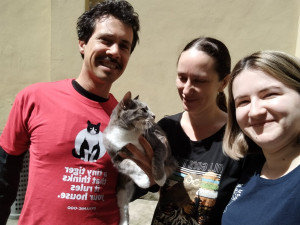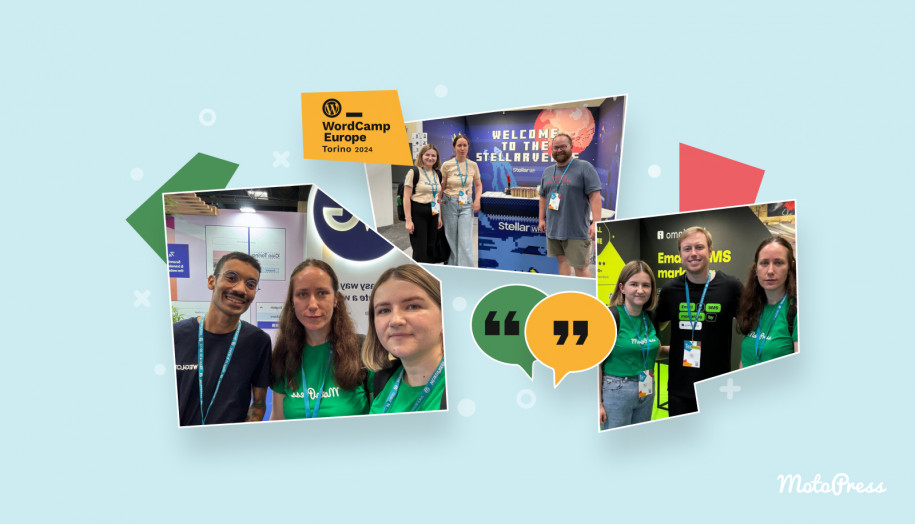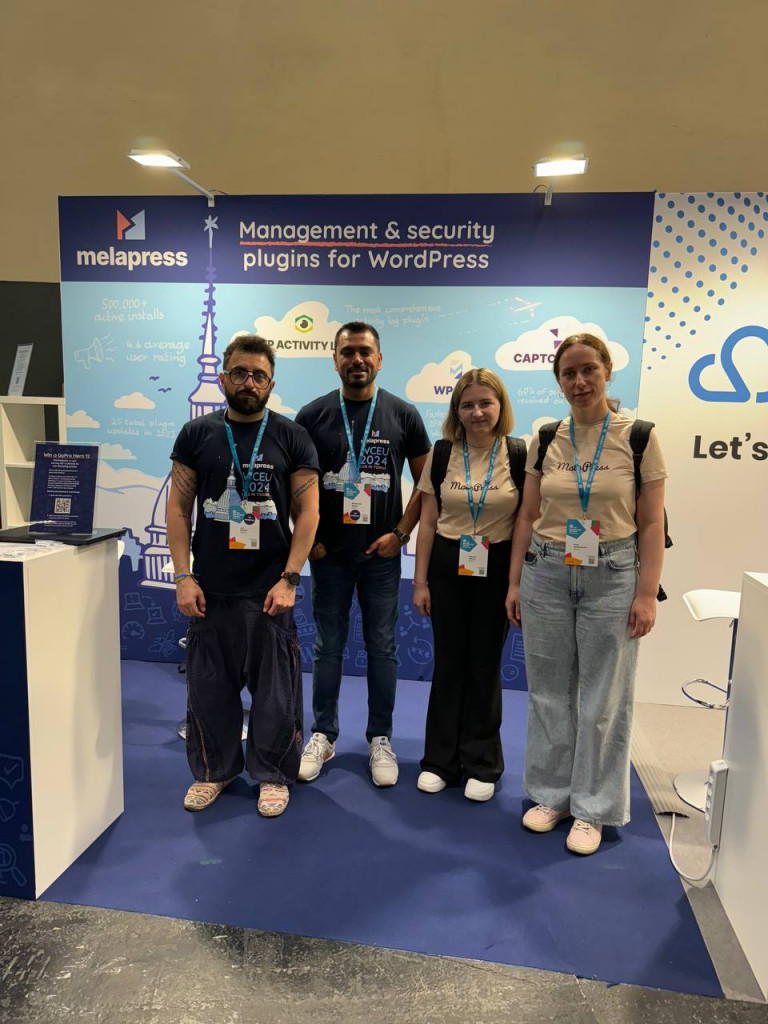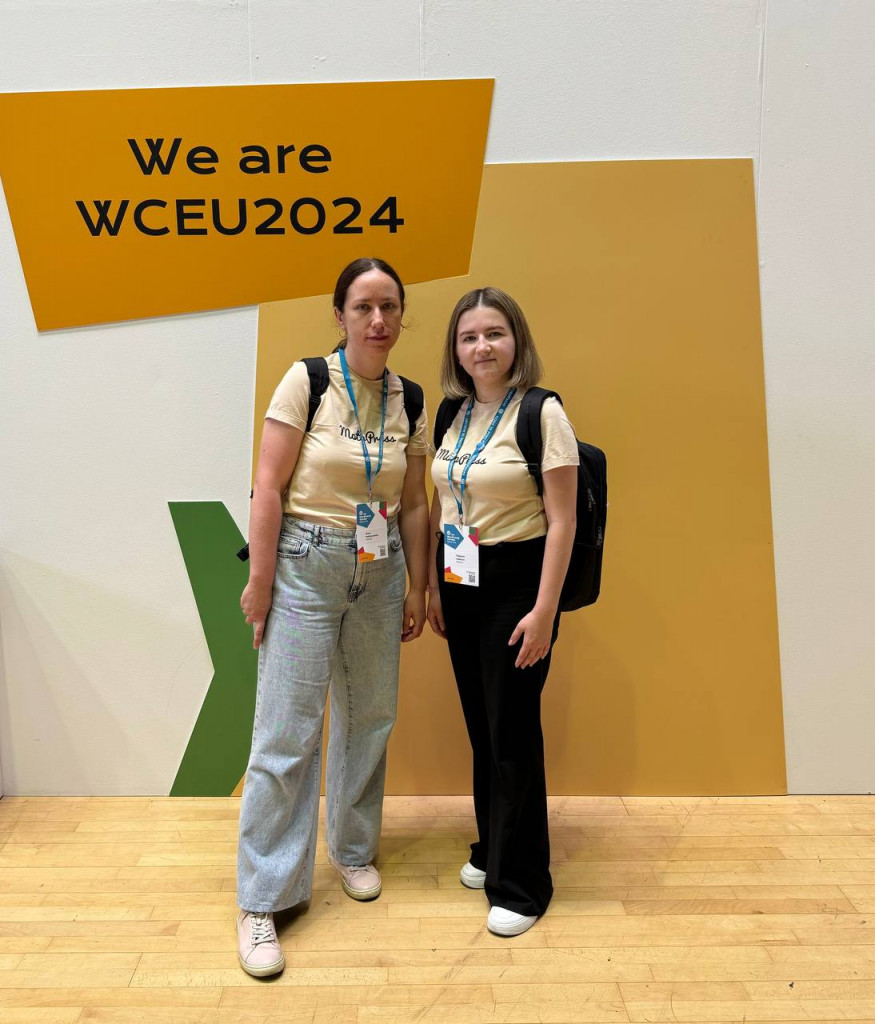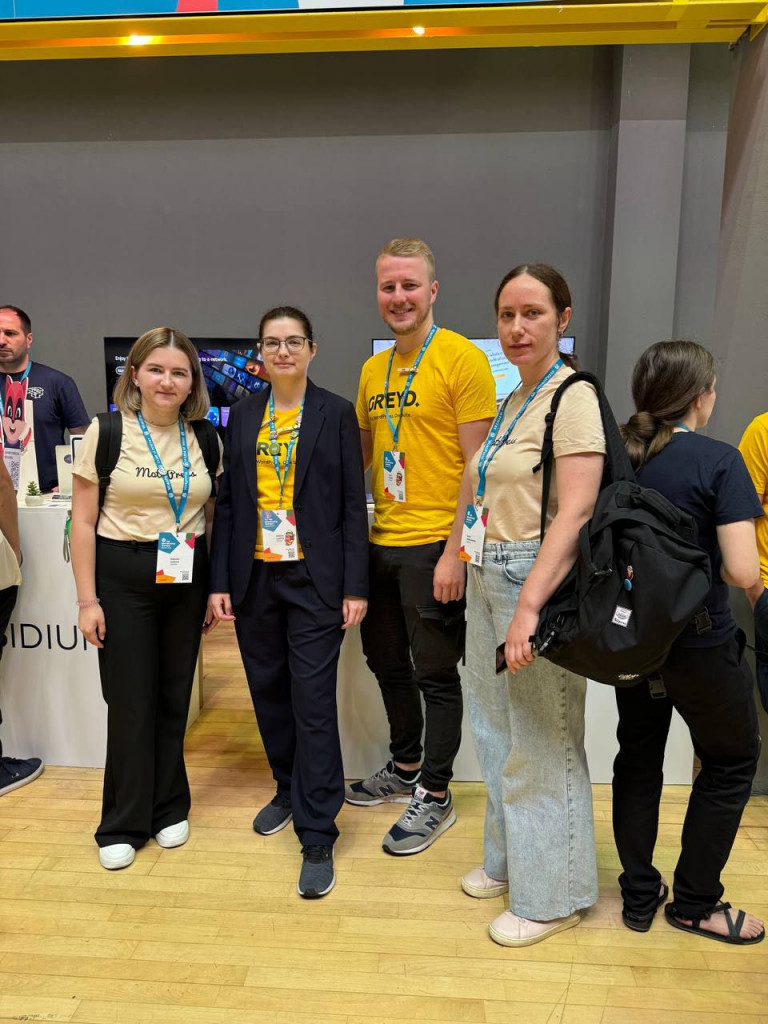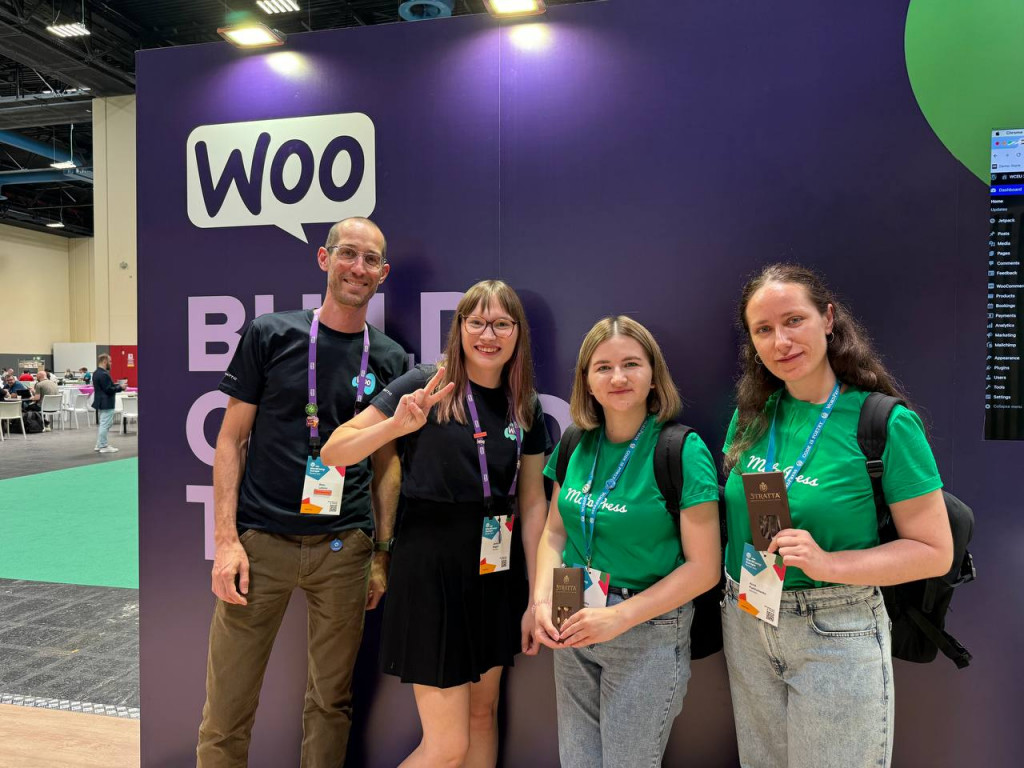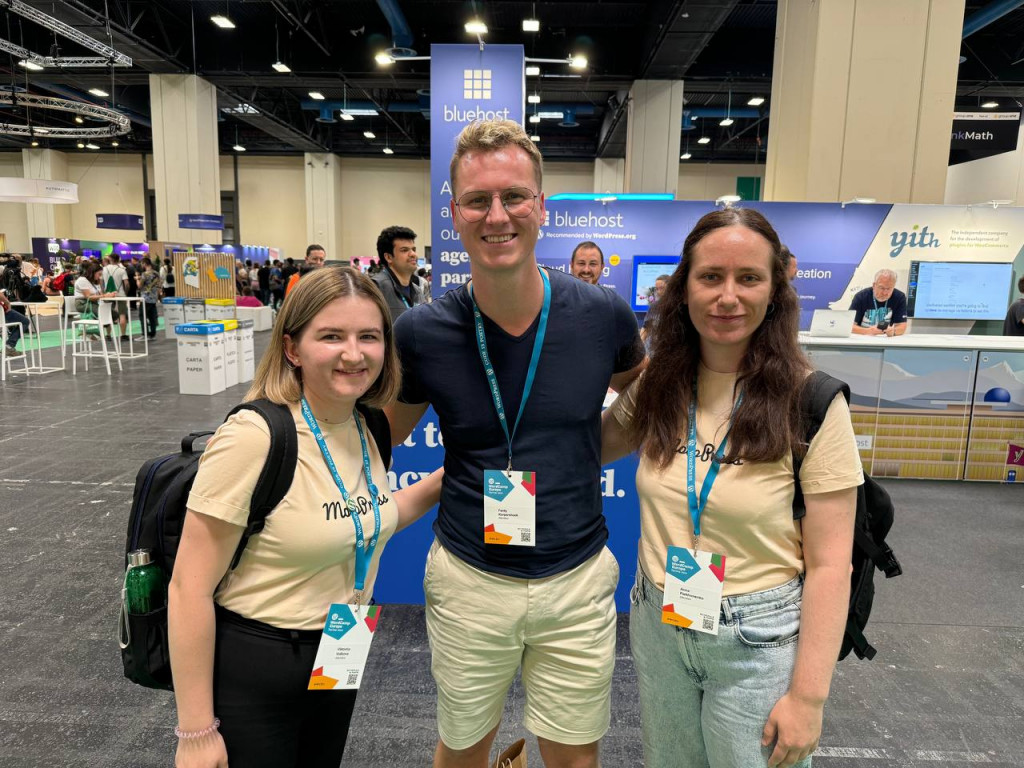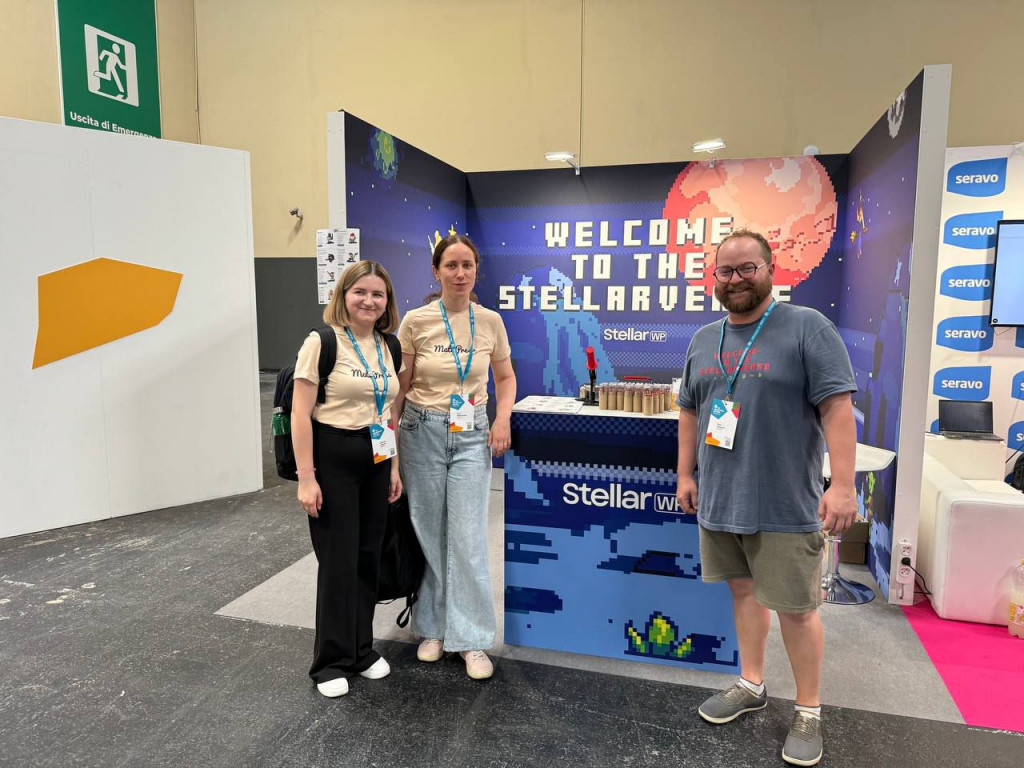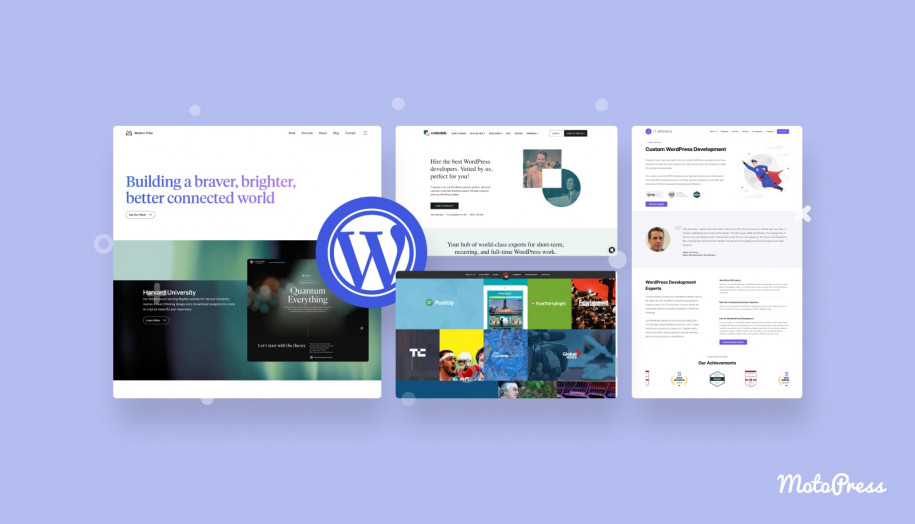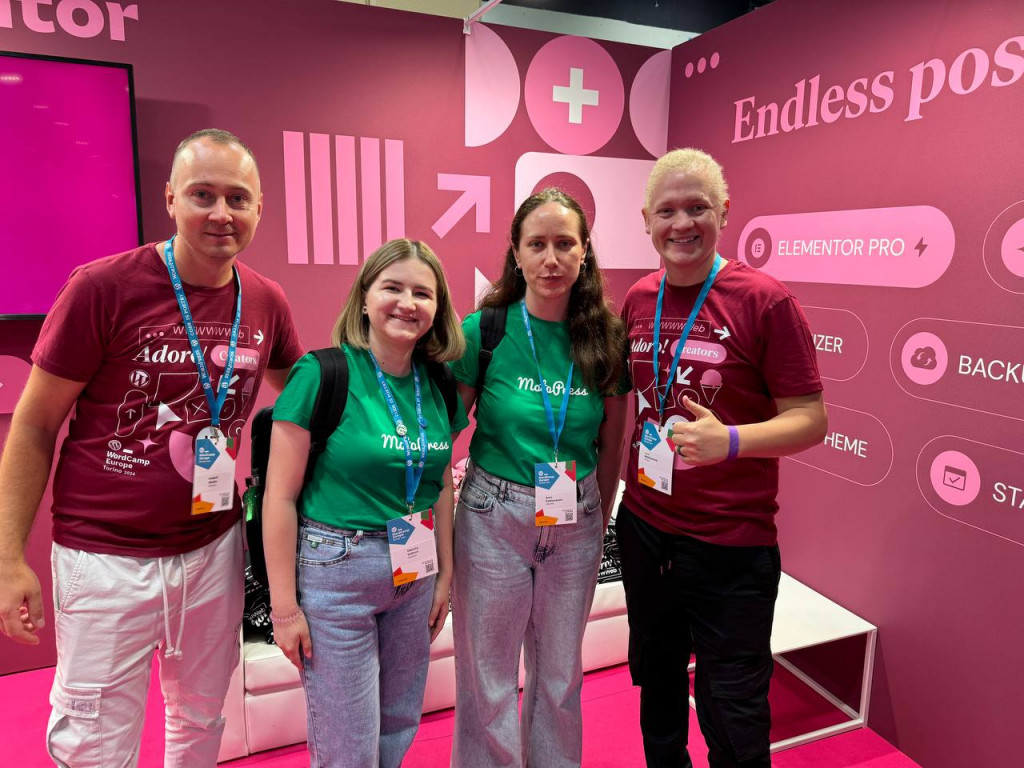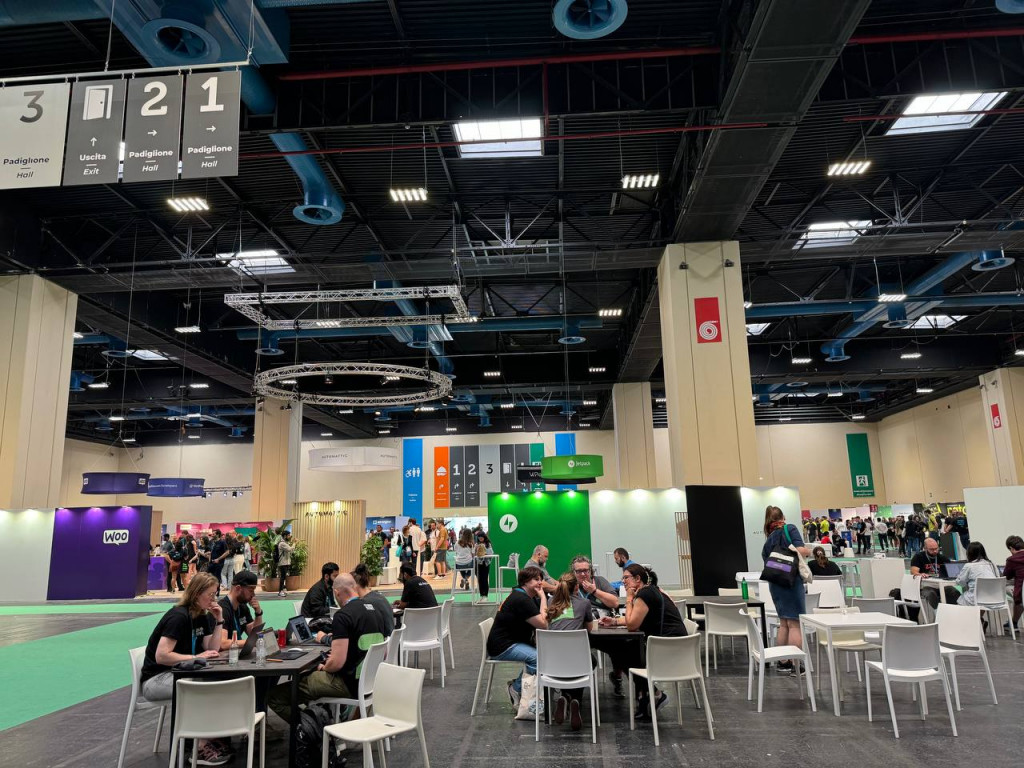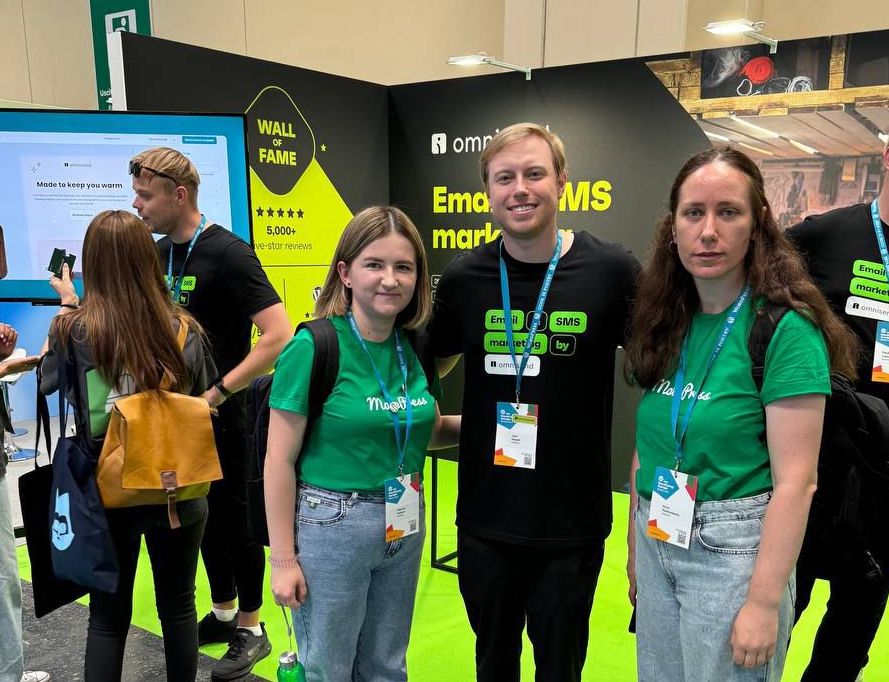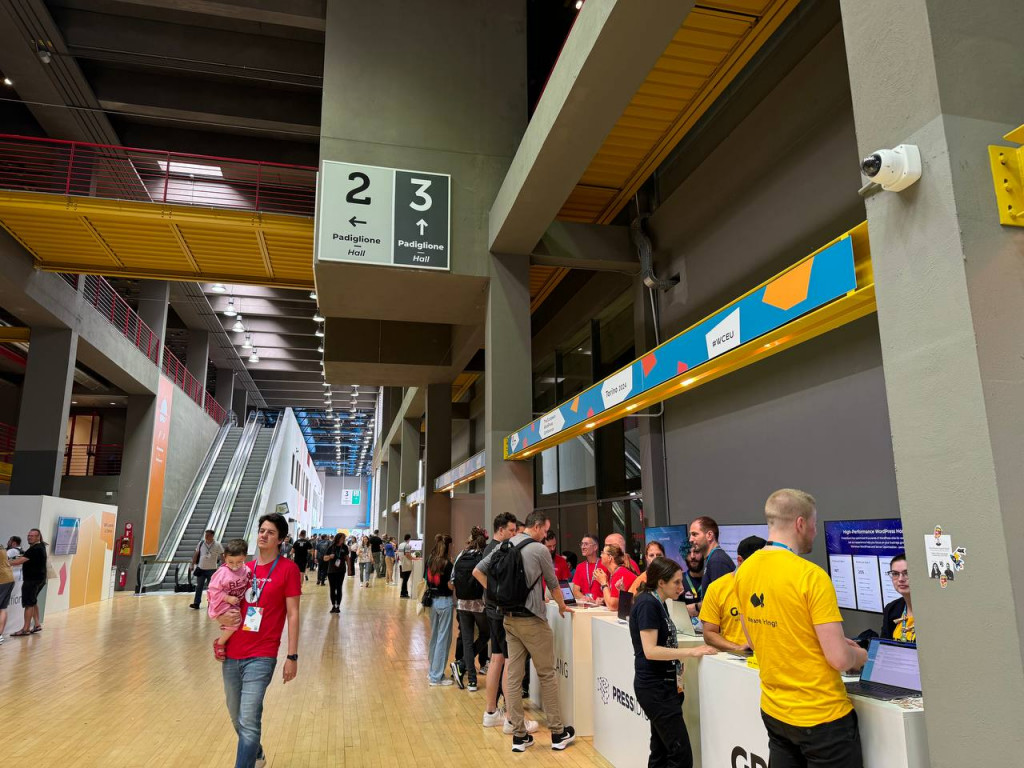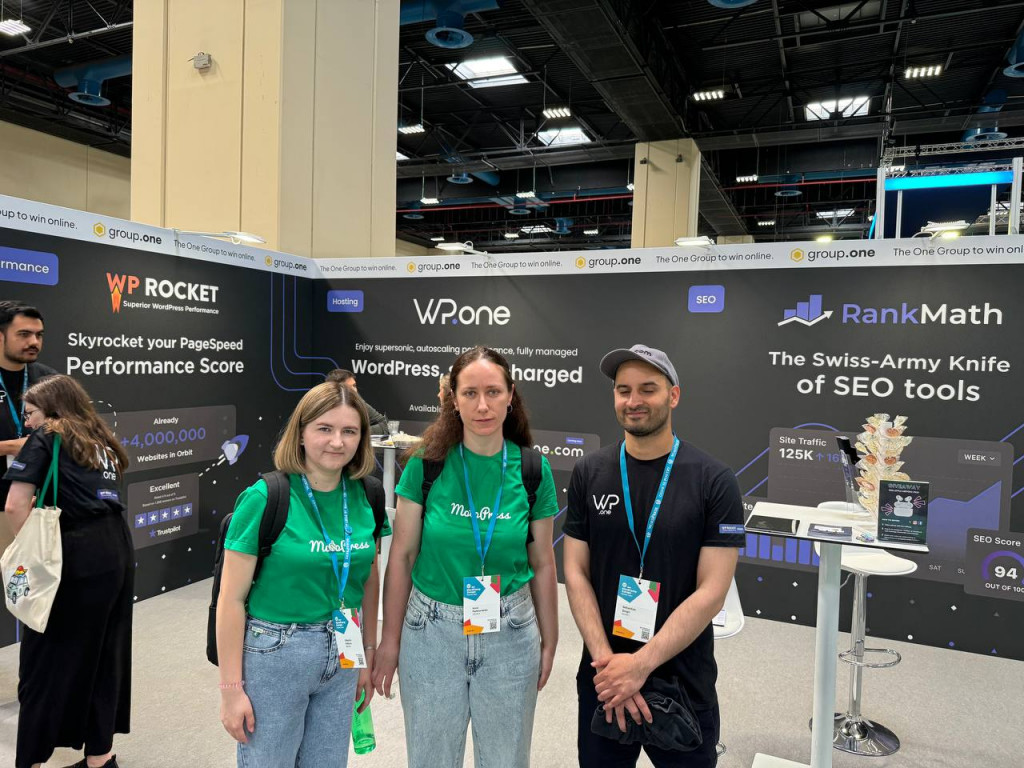WordCamp 2024: What Were We Chatting about with WordPress Product Companies?
Table of Contents
At WordCamps, we are all seeking something – getting industry insights, building brand awareness, and then just having a genuine human connection.
At this year’s grand WordCamp in Torino, we found a bit of everything (not to mention the delicious pizza and ravioli!). But the most memorable moments are usually the conversations with fellow WordCampers. So, we thought, why not share these chats with you?
There was plenty to talk about – from the weather in June in Torino (who expected those storms?) to whether it’s legal to break spaghetti (we’re still unsure about that one). But no worries – those conversations stayed off the record!
For the record, we asked the same questions that MotoPress, as a plugin and theme company, grapples with daily – which marketing channels are effective? What tools should we use to measure results? Can AI play a significant role in product development? Is it time to fully embrace FSE themes, or is the market demand not yet strong enough for such themes? Etc.
So, if you’re in the mood for insights straight from business owners, developers, marketers, and everyone involved in the vibrant WordPress community, welcome!
We primarily chatted with sponsors – yes, because it was easier to catch them – they had to guard their booths all the time! Due to a lack of time, with just a few of them, actually.
My high school biology teacher always said that the only thing that never tires humans is communication, so if you are already missing WordCamp conversations, enjoy!
Marketing channels: “There are no quick wins”
So, we all want to make our awesome plugins, themes, and services more visible to those 43.4% of the web. We just asked what works for others in this regard.
Josh Hargett from Omnisend, a super popular service for email and SMS marketing supported by a team of 230 people, says that organic traffic is key:
“Omnisend is a bootstrap company. We’re organically funded. We’ve never taken VC funding and we’ve grown to over 100,000 customers organically. So we relied a lot on SEO for that. SEO and blogs are important. I’m on the sales team so I’m not the person who’s implementing this, but SEO and then I think we do a lot of Google paid campaigns. I’m not sure what our Meta account looks like, but I know Google is a pretty substantial part of our paid ad strategy, and then SEO and blogs. We’re just now getting into more affiliate, or influencer marketing, especially in the WordPress space. So we’ll be working more on YouTube, primarily. YouTube and then some LinkedIn, but primarily YouTube. Just because it’s more of a visual product here, so more longer form content performs best, typically. I think almost all of our content is created or produced in-house. If we are producing tutorials or knowledge-based articles, then our blogs are written in-house.”
– Josh Hargett, Omnisend
Alexander Gilmanov from Amelia, one of the most well-known plugins for appointment scheduling and event booking, shares his views on launching and marketing a WordPress plugin step by step:
“I think for plugins, number one would definitely be WordPress itself. So a free tool in the WordPress plugin directory. If it’s not just some demo version, just some very, very basic thing that doesn’t do anything but just tells you to upgrade, if it’s a really nice tool that helps people solve some problem, it will work. So it will create a community, it will create a user base, and then eventually it will help people to buy the paid version of your product. But you need to do the balance right. I think this is what you split initially. And many of the popular tools like Elementor also do that. So I think this is the top one.
I would say the second one would be content marketing. Maybe we can join here text content marketing, blog and YouTube. But the thing here is also not the quantity only. Quantity is important. If you put one blog post per month or something like that, you need to target a lot, but then you can’t just do numbers. I need to do really high quality content and content that people will read and people will stay on the page because Google tracks that…
Everybody has Google Analytics, so we are tracking Google Analytics. And then there are these default metrics that are actually the most valuable – number of visits, but also bounce rate, time on page, scroll rate. And this is already enough to know. Because if it’s just average time on the page is one second probably it doesn’t answer the question. And then you try to reorder it, try to A/B test it. So yeah. And for videos, same applies. Because I think video is the new blog, and it’s harder to do a little bit. You also need to create high quality videos and it’s harder because people like watching videos, but you really need to create it in a professional way, so it hooks you in the first second. Because people, the average watching time is maybe 5 seconds. If they are not interested in the first 5 seconds, they will not watch it.
And the third one, I could say paid advertising, but it really depends. For some products, especially for WordPress, it still works, but for some products like SaaS tools, especially if you’re a new product, it’ll just burn the budget. It’s, you know, yeah. $10 per click or something like that.”
– Alexander Gilmanov, Amelia
He also mentions that social networks didn’t work for them as expected, with only active Facebook groups performing relatively better. He then shared his perspective on what he would do if he needed to significantly grow their business:
“We don’t do it yet, but I think this is something that I think is worth trying: creating small tools that solve a common problem, that’s common for many people. And then use those small free plugins as a way to broaden your reach. To market your, like, parent brand, maybe. I think there are no quick wins, especially if you already have an established product. If there was some magic bullet to start doubling from tomorrow, it would be great. I don’t think it exists, you know. You have to do compounding, grow by 1 percent every month.”
– Alexander Gilmanov, Amelia
Oliver Morrison and Dave Page are already sponsoring WordCamp, even though, as we learned from them, they had launched their product, PersonalizeWP, just one week before the event!
With their plugin aimed at WordPress personalizations that can boost user engagement, increase conversions, and drive revenue, they are just beginning to figure out how to leverage marketing for their own project:
“We are early on a journey, we are still understanding that – but i think that ultimately having a very good organic content is key. We are understanding our audiences, what their problems are.”
– Team PersonalizeWP
They got investment last year from Emilia Capital, and were looking for some feedback at the main European WordCamp. We definitely need to catch up next time to hear how it’s going!
So do businesses see WordCamps as a way to broaden their reach?
Milena Bimbasic from Maksimer, a Norway-based studio and a certified e-commerce expert (our awesome booth neighbors from the previous WordCamp in Athens!) explains that they actually found a few customers through sponsoring WordCamps.
Guys from Polylang, given their seemingly good experience with WordCamps, add without a doubt:
“If you want to root your plugin into the community, you need to be good with the community. It might take longer, but once you embrace the community, everybody talks about you.”
– Elisabeth, Polylang
It’s interesting how many product companies, despite apparently having a well-thought-out business model and niche segmentation, admit they could actually do more in marketing and want to improve in this area. For example, Stephane Menet from WP Connect shares:
“We are not so good at marketing – we can do more. We are really on SEO, so the organic search to the product pages. Tutorial videos are really of high importance, documentation, to allow the prospect to understand what to do. WP.org brings us a lot. We are freemium, this is how we catch the people – we have free plugins, free addons, totally free, like CF7, and only paid plugins as well, which you can find on our website. We do some guest posting with Gravity Forms, with other plugin companies. We are in the niche so we are the only one to do plugins like so.”
– Stephane Menet, WP Connect
Mark Westguard, the founder of WS Form, the developer-oriented form builder WordPress plugin, explains which channels work best for him:
“The two key things I do are community involvement. So working with, well, WordCamps is one big thing that I do. So I sponsor all the flagships and that gives me brand awareness. Good way of giving back. Don’t sell plugin licenses at the event. This is more about meeting people and networking and working out other ways of building out your network. And the second thing that I mainly do is, you know, working with content developers and influencers and people like that. We’ve really got to build genuine relationships. You can’t just go to these people and say, hey, here’s my product. It’s going to have a value to our audience. And that’s basically how I do it.
…For me, this was a ridiculous product to build. So there are lots of form plugins out there. So you have to differentiate yourself. So where we differentiate ourselves is that we are very -developer, -agency focused, building forms rapidly. And we just have a ton of functionality built in. So really the way we’ve made ourselves different from other form plugins is to be a very rapid form development environment. But in terms of actually promoting that, it’s the same as any other business. You’ve got to build these relationships with people. And that’s taking time, you know.
..So even though there is competition, they’re all great people and we all learn of each other. You know, I’ve had them actually give me help and help me out with stuff. And I’ve had former plugin developers that sold their plugins in the past sit down with me and just tell me what they’ve done. So it’s easy to learn in this space – you just have to ask people and it’s really nice in that respect.”
– Mark Westguard, WS Form
Also, Ankur Chotai, the founder of BookingPress and a first-time sponsor of WordCamp Europe, says they are sticking to the classics because there is no silver bullet they can recommend:
“I will be honest with you – no one particular marketing technique. We do SEO and we do some affiliate marketing – a little bit of everything.”
– Ankur Chotai, BookingPress
Muhammad Nadeem from MelaPress, a popular suite for all things related to WordPress site management and security, provides insights into their marketing approaches:
“When it comes to promoting the plugin, usually how we are approaching the thing that is based on our audience, where our audience is based on and how our touch points are, we can get all those, data analytics from GA4 and all. So we know what touchpoints our audience has. So we channel those as well. But apart from that, we do a lot of content marketing and also we do not really heavily promote the plugins in paid version kind of thing, but we definitely go more with organic because we know that organic can convert quickly.
And also collaborations with third parties, partnerships and all. We have had very successful partnerships over the last years and all. And we always see the demand for how our audience is interacting with us and we are delivering in the same manner as well.
We have agencies, medium, small enterprises and all. So we definitely go where our audience is coming from, and we channel them accordingly in fact.”
– Muhammad Nadeem, MelaPress
Their impressions of the impact of WordCamp resonate with some of the responses of others we’ve chatted with here:
Well, measuring the success of WordCamps is quite difficult. Basically, we do come and we sponsor these events for the sake of exposure of the brand. But when it comes to acquiring the clients and making the sales, that’s not really something that you can achieve with WordCamps.
– Muhammad Nadeem, MelaPress
Many noted affiliate marketing among the top marketing channels they use, so, when we encountered Ferdy Korpershoek, a super successful WordPress affiliate marketer and vlogger, at the end of day two, we couldn’t resist asking him what it takes to excel in this field:
“Focusing on helping people, not on making money. Being as good as you can, as the quality of everything you create should be the best quality possible. So if you think, okay, it’s finished, go over it one more time to see if you can make it better. And go for it for the long run. Don’t give up if you don’t see any sales between a week or a month. Keep on thinking about helping people. And if you give, I think it will come back to you.”
– Ferdy Korpershoek
We even asked about the top three tools he uses for creating his tutorials (that’s what you’re supposed to ask when you come across a super star video blogger, isn’t it?).
“In my case, it would definitely be my video editor – Adobe Premiere and Adobe After Effects. I use ScreenFlow to record my computer screen. And I use YouTube as a tool, so I would prefer YouTube because I think through videos you can reach more people and it’s more relevant than blog posts. I’m sorry for the bloggers to say that. 😃”
– Ferdy Korpershoek
Answering the question about marketing channels that work for Weglot, another popular translation plugin, Thomas Fanchin from the team suggests the following:
“I think it’s a mix. We do a lot of affiliate marketing, but it’s also a lot of content (we have a really good content team). We publish maybe 3 articles per week – it really depends – we try to be really cautious about what we are putting, so things can take a little bit more time. We create a lot of educational pieces, because it is what’s working for most.”
– Thomas Fanchin, Weglot
We also had a chance to speak to Gabriella Laster from Elementor, who works on the marketing team, and asked her to share the day-to-day marketing strategies of the leading commercial page builder for WordPress.
“I think in terms of content creation, some of the most, the assets that work the best are actually valued for the user. So not necessarily trying to push a specific feature, but we’re actually showing a feature, what we can achieve, or giving them inspiration, or giving them tools to succeed. We found that to be incredibly helpful for our users, and also a lot of fun to create, because we can be very creative. We do a lot of YouTube videos, a lot of video formats, social content, social activation, trying to get the community to interact with us, to engage with us, with the product, to bring more awareness and adoption to certain features, and also increase the usage of specific features that we know help our users succeed. So sometimes not all the features are very discoverable, sometimes they’re harder to find, users don’t know about them, so using community excavation and things like that to bring more awareness to those types of things. We do use Ahrefs, we also use Google Console. We have our own internal AI teams and we analyze data. We track views and engagement on different social channels, on Google, on Search. We learn a lot to modify for future activities. Learning what works, what works better, what doesn’t work as well. Everything we do needs to be measured.”
– Gabriella Laster, Elementor
Flavia Mezzetti from TranslatePress shares that content marketing is their main thing and that they see WordCamps as one of the creative ways to promote their brand and build partnerships:
“We have a blog. We write there consistently. We also do some Google Ads. But we always try to focus more on organic – as much as we can. And also partnerships. We do keyword research. A lot of it. We usually use Google Keyword Planner as the main one but we also use Ahrefs and some other smaller ones – here and there. This year we have these games to guess the flags, to guess the languages, and try to get people engaged with us, talk with us, and possibly get interested in our product as well.”
– Flavia Mezzetti, TranslatePress
In response to a question about measuring the impact of sponsoring WordCamps, she acknowledged that it’s a difficult task:
That’s pretty hard to say. Because the main thing we want to get after this is brand awareness. But this year, we tried the strategy where we offered some discount codes. We have a limited number of them and we’ll see how many of them will actually get used.
– Flavia Mezzetti, TranslatePress
Drew Griswold from StellarWP, a highly popular family of plugins including KadenceWP, The Events Calendar, LearnDash, and others, graciously shared his experience before heading to his next meeting:
“Absolutely. We’re in a unique spot where a lot of our plugins were built using an organic word of mouth audience through the WordPress ecosystem, WordPress.org, thinks like that.
Over the last few years, we’ve really tried to refine our paid advertising program. On platforms like Google and Facebook things like that. Oh, Facebook for us has been a really, really great tool. If you know how to use it and you know how to target it, it could be a really effective retargeting tool. And we found really good success with prospecting too, which is kind of the golden goose with online advertising. It’s like profitable prospecting with display advertising. So Facebook and then also our affiliate team does great work.
And then, content marketing has been a huge part of our strategy, on several of our brands for the past five or six years. So right now everybody has the same unique challenges of how content marketing is evolving in the face of Google’s algorithm changes and AI and things like that. But I think it takes a little bit of everything to have an effective, proactive marketing program.”
– Drew Griswold, StellarWP
We also asked about sponsoring WordCamps and whether it has any impact on their already popular brand:
“It absolutely helps from the partnerships perspective, especially, we get a chance to connect with so many new products, so many legacy products and products that we’ve worked with for a long time.
Opportunity of ways to talk, talk with them about opportunities and different ways to work together, but also finding new customers that are inside the ecosystem. So WordCamp really offers the best of not just both worlds, but all of the worlds when it comes to talking to prospective partners, prospective customers, current customers as well.
I can come by and get some swag and talk to their support tech. You know, talk to our development team. There’s just nothing that really replaces that face-to-face interaction.”
– Drew Griswold, Stellar WP
Block Editor: “No proprietary system that is essentially an alternative solution to the core will be sustainable”
The block editor, Elemntor, Bricks, Oxygen… Which one should you use for building your theme tomorrow?
The block editor was one of the biggest evolutions for WordPress. How much ‘for granted’ is it taken among plugin and theme developers? Are they ready to build products for/integrate with the core? Is it more profitable to stick with successful page builders?
When chatting with Piero Aiello, a developer from Dynamic.ooo – a popular extension for the Elementor page builder – he shared his concerns about working with the block editor:
“For my work, normally I prefer Elementor. But if the question is if I prefer the block editor or page builder like Elementor or no page builder, I prefer no page builder, second place Elementor and third place – the block editor. As a developer at this time, it’s not so easy to make customization in the block editor. If I have to do it, I will. But the documentation is not so intuitive and so easy. So as a developer, I make it, I will make it if I will need to, but it’s not as easy as other customization tools, or also by code. By code, maybe I will spend one day making a new Gutenberg block – It’s okay, but maybe I will spend three days. In the next month or next year, 50% of WordPress will be integrated with the JavaScript library. And I hope so. But this time I think we are in the middle of the journey. If I have to make some plugin about the comments, about the block editor, at this time, I don’t know if the time I should spend will be right, because maybe some documentation, some API will change from version 1 to version 2, and maybe then I should make some modification of the flow. I prefer to wait some months to check the documentation, the new version.”
– Piero Aiello, Dynamic.ooo
Jessica Lyschik from Greyd, one of the Speed Build Session presenters and lead developers of the 2024 default theme for WordPress, emphasizes how continuous learning in web development can help tackle many obstacles. And since the team has just released the Greyd WP theme, we asked whether, from a developer’s perspective, it is easier to build a theme using the default block editor compared to using a page builder.
“Actually, I am not sure if it’s easier – because people are used to the previous ways of building things when they build the classic themes for many, many years. So people are used to that. They know how to achieve templates in that theme, how to achieve custom templates, how to put building functionality. And I think the biggest issue is not the technical aspect, but the hassle of learning how to create a block theme. And of course, the documentation has been a struggle a lot, but it’s getting better and better definitely. I can only highly recommend a developer blog from wordpress.org because they have articles about that. They’re like small articles for a specific topic, but in depth. And they also always use the outreach channel like Slack where you can post any questions and can always get an answer there, which I found very helpful when we were building our theme. And yeah, that’s probably the best advice I can get. It is a learning curve. And I think it depends on how much you are open to it. If you say ‘I do not want to work this, this is crap’, then you will have a hard time, and if you try to embrace the new, if you’re curious about it, and take you and take some time to actually learn and experiment with existing block themes, you’ll find that you can recognize some patterns – and it will be easier for you to create a whole block theme.”
– Jessica Lyschik, Greyd
But since it may seem more challenging (at the moment at least) to advertise and sell FSE themes built with the default block editor compared to those using commercial page builders, we asked why Greyd chose this approach; Jakob Trost, the CTO of the company, who has clearly given this a lot of thought, also shared his opinion:
“Okay. Because it’s the core. And I truly believe that in the long run, that no proprietary system that is essentially an alternative solution to the core will be sustainable. Like Elementor, for example, is huge. And they will be around for a long time, probably because they’re doing a great job. They’ll be relevant for a long, long time. But for example, for us, we are a small company, and we can utilize all the good work that the core did to build our features on top of it. It’s de facto a standard now – and it makes it really easy for us to utilize all the other plugins and solutions that are out there. Because if you use us, we are natively compatible to the core, and you can use every other solution out there that is also natively compatible to the core. So we don’t have to take care about if we, for example, choose a solution like Elementor, we would have to take care to be compatible with Elementor, and all the other solutions would have to take care of them to be compatible with Elementor. They also need to be compatible with the core tech work business. So they have to be compatible with two different things – one third-party issue and one core issue – and that is a lot of effort. And to be just compatible with the standard will be a lot easier.
But we found out in our experience, there are actually a lot of people around that do like WordPress as a core tool, and we’re building websites in lots of different ways, and I think we’re getting more and more, at least we [as a company] are getting more and more traffic and people that realize, okay, the block editor is kind of a grown-up tool now and we can build professional websites with it. Actually, there are a lot of really good solutions out there. For example, like ours that do certain things and help me to build a professional website. And I think this word is spreading. And, you do get a lot of benefits out of the box. You do get great performance, you do get lots of lots of features, and it is all accelerating really, really fast. And you can now visualize, okay, this is really the future. There is something going on. And in my opinion, yes, there are still lots of lots of users that won’t switch probably for a long time. But there are also a lot of users who don’t even have used any page builders. So still, in our experience, especially when you come to a professional WordPress system, a lot of clients still, to this day, use ACF approaches, custom approaches; and those specific solutions can do a lot for your clients. And actually this is really suited for professional websites if you use it the correct way. Obviously you don’t want everybody to change everything, but I think this word is getting out. The discussions are getting out and especially when you talk to people here, there are a lot of professionals and they are we are I think are more and more getting there.”
– Jakob Trost, Greyd
We also encountered Art Ramadani and the team (of alchemists) from Laborator.co, creators of WordPress themes including the renowned Kalium theme. Surely, we asked them about the page builders they use.
“We are working on Elementor and partly Gutenberg. We plan on using both of them. Users mostly requested Elementor demos and starter sites, but we are also working on integrating our themes with Gutenberg and releasing new blocks, new features for both of them. Yeah, we have some built-in add-ons, features only for our themes, for Elementor, but for Gutenberg we have not done any blocks yet, but we are planning to do so. So we can use both of the page builders and maybe other page builders as well in the future. In the future we plan to release some full-site editing themes, as that seems to be the future.”
– Art Ramadani, Laborator.co
AI: “I feel like AI at this moment is kind of a gimmick”
We also asked WordPress product companies to see if AI is still just marketing hype or a really big thing for their business. Can it truly influence the customer experience and boost product appeal? How are companies already using this technology; and if you are just thinking of building a plugin, should you consider it, too?
Elisabeth from Polylang explains that since ChatGPT started circulating around, the users of their plugin ask about it more and more in the product:
“We have thought of AI to integrate to the plugin but it’s not yet to be done. AI is not to be afraid. It’s evolution. The idea is to integrate it maybe for the automatic translation, it’s work in progress, nothing is done yet.”
– Team Polylang
When I asked the team behind another translation plugin, Weglot, if they were concerned about AI’s impact on translation plugins, Thomas Fanchin was quick to respond:
“Not really because it’s a different use case – you can have AI and the translation plugin too, and they both work together. We also have AI features inside of Weglot too, we can make it both work together depending on the use case. We use AI for translation memory, but it really depends on the use case. People can do the entire translation process by themselves, not using any translation plugin, it’s a different use case. And you can use a translation plugin to do everything automatically for you. If you are a multisite, it’s another use case, when you are an e-commerce, it’s another use case. It really depends on what you are trying to accomplish. I think there is room for everyone in the ecosystem.”
– Thomas Fanchin, Weglot
Chris Hinds from Equalize Digital explains that he personally uses AI to tackle time-consuming tasks, such as analyzing a lot of information and condensing it into something that’s more digestible. At the same time, he also cautions that AI might not work perfectly for their type of plugin:
“In the accessibility space, with our Accessibility Checker plugin, I think there are some dangers around AI. We know that it has tendencies to hallucinate or to get things wrong. When we are talking about the application of AI towards basically making the web more accessible, I think that there is a real potential for harm against individuals with disabilities if an AI gets it wrong …. So that’s why we are of the opinion that we want to be proactive about accessibility, we want to prioritize fixing accessibility natively instead of putting something over the front of the website, in between the user and the website that could get things incorrect. I think it’s a double-edge sword – it’s very beneficial but it also has potential for harm if it’s misused.”
– Chris Hinds, Equalize Digital
Josh Hargett from Omnisend elaborates deeper on AI and its applications within their service:
“I think AI can be used in a positive or negative way as most innovations can be used. I don’t think it’s a replacement for human critical thinking, I think it’s an aid. So using it for, for example, in the emailing SMS world, what a lot of customers want is, “can you write the full email for me”? And they don’t like to put in prompts. But when you give it prompts and you share more of your customer persona and the target audience and kind of guide it, it can help brainstorm. So it can really cut down on brainstorming time in outlines. But you still need some critical thinking.
So we do have AI built in with the content side. Again, you have to put in a few words of an option. Subject line testing. So for context for this recording, email and SMS marketing for WordPress, WooCommerce and online stores. So whether that’s a subject line, a preheader or the actual content with an email, we have an integration with ChatGPT where you can put in the prompts or keywords and it will write your emails for you. It’s a free feature. We have a free plan and then two paid plans, email only, email and SMS. All accounts have access to AI. There’s no paywalls for any feature really.”
– Josh Hargett, Omnisend
Sebastian Singh with Group One, which is now owns such popular WordPress plugins as WP Rocket and Rank Math, highlighted the controversies surrounding AI:
“We are currently working on integrating it into our onboarding wizard so that we can generate the website content tailored to whatever input, whatever business or service. To be honest, I feel like AI at this moment is kind of a gimmick, to be something that is advertised, to boost sales or whatever. I have not found many examples where it is actually like legit working. I would prefer to have a nice integration that provides value to the customer rather than just being a gimmick. That is what we are working on currently.”
– Sebastian Singh, Group One
Flavia Mezzetti from TranslatePress says they have already launched some features and are seeing excitement from clients around them:
“We actually very recently launched our AI feature. It’s going very well. It’s a slow build up, soft launch. We’re gathering speed, and clients are pretty happy with it. We detect the best combination of language pairs, and we serve what we think is the best translation for that language pair.”
– Flavia Mezzetti, TranslatePress
Mark Westguard tells us about really advanced AI features he integrated into the WS Form plugin:
“We were one of the very early adopters of Open AI, so we have an open AI plugin and that enables you to do two things. First, you can use all the Open AI functionality within a form, so you can use it to generate images, generate content. You can actually use the moderation endpoint to check for bad words and things like that. And then we also use it to enable people to create a form from a prompt. So you could say ‘create me a doctor’s appointment form’ – and it builds a form for you. It’s a free add-on for that. And people do use it and they want me to keep up with it. That’s the main thing right. Open AI is coming out with lots of new models. And they’re also always changing the APIs. So we have to modify our plugin to do that all the time. A learning curve to developing this AI feature wasn’t difficult. They made it very easy to integrate with. It’s just interesting trying to learn how you can use it with your plugin. So we were really pleased to see that we could use it to actually build a form, you know, people use it and it takes accessibility into account. So we don’t actually put help text in and all kinds of stuff. So yeah, we’re pleased with it.”
– Mark Westguard, WS Form
Mamma mia, is this it?
Did you enjoy the chats? Because we did! Our only regret is not talking to more people. But we’re leaving you with your own conclusions for now!
P.S. Whether you are a seasoned company or thinking of starting one, and if you didn’t attend the conference but want to gain in-depth and structured insights on the topic of promoting your WP product, we highly recommend checking out the slides from this year’s session by Katie Keith (Barn2 Plugins) and Matt Cromwell (GiveWP) titled “We spoke with over 50 different WordPress product owners. Here’s what we learned”. Worth it!
P.P.S. We didn’t do a traditional recap this year, but if we did, it would definitely include some invaluable information, like a picture of the MotoPress team with our Airbnb host Lorenzo in a Dynamic.ooo t-shirt, alongside his cat Remigio (ears perked up).
